Events management presents unique challenges for website owners. From scheduling and registration to payment processing and attendee communication, the requirements can quickly become complex. WordPress events plugins solve these problems elegantly. They transform your standard website into a powerful event management platform without requiring technical expertise.
WordPress powers 521 million websites globally according to recent statistics. This widespread adoption makes it an ideal platform for event management. With the right plugins, your WordPress site can handle everything from simple meetups to complex multi-day conferences.
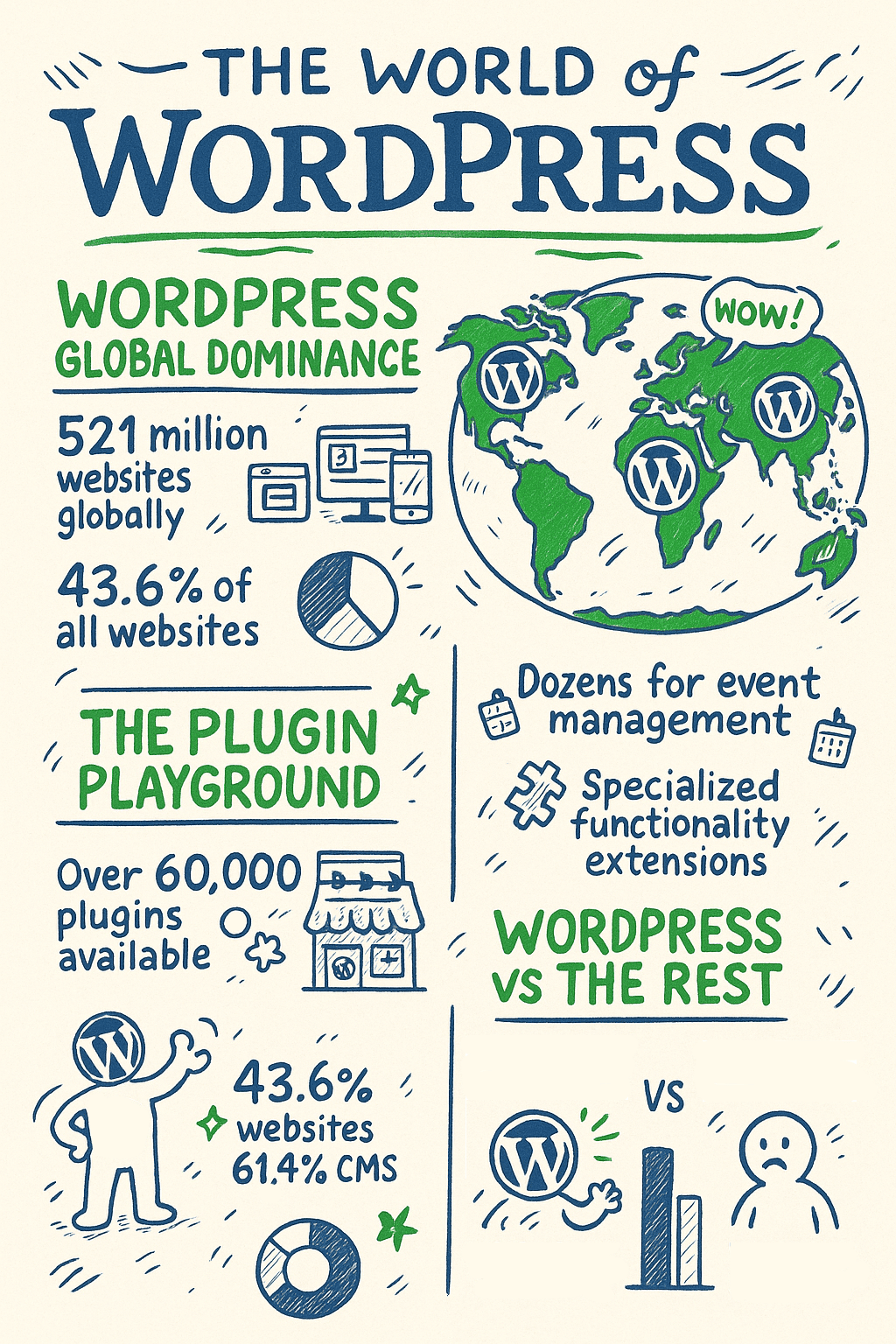
Our team at CyberOptik regularly implements event management solutions for clients across various industries. We’ve seen firsthand how the right plugin can simplify operations and improve attendee experience. This guide will help you understand your options and make the best choice for your needs.
Understanding WordPress Events Plugins
WordPress events plugins extend your website with specialized functionality. They add features specifically designed for creating, managing, and promoting events online. These tools fill the gap between basic content management and dedicated event platforms.
The core purpose of these plugins is simple. They help you display event information in an organized way. Most plugins offer calendar views, event detail pages, and registration systems. This creates a seamless experience for both administrators and attendees.
WordPress itself powers 43.6% of all websites on the internet. This massive ecosystem supports a wide range of plugins, including dozens specifically for event management. The variety ensures you can find something tailored to your exact needs.
Event plugins typically handle several key functions:
- Event creation and editing – Tools to set up events with dates, times, locations, and descriptions
- Calendar displays – Visual representations of your event schedule
- Registration forms – Ways for attendees to sign up
- Payment processing – Methods to collect fees for paid events
- Attendee management – Systems to track registrations and communicate with participants
Understanding these basic functions helps you evaluate which plugin best matches your requirements. Not every organization needs the same set of features. A small community group has different needs than a professional conference organizer.
Key Features to Look for in Events Plugins
Choosing the right events plugin requires careful consideration. The features you prioritize should align with your specific requirements. We’ve compiled a list of essential capabilities to evaluate during your selection process.
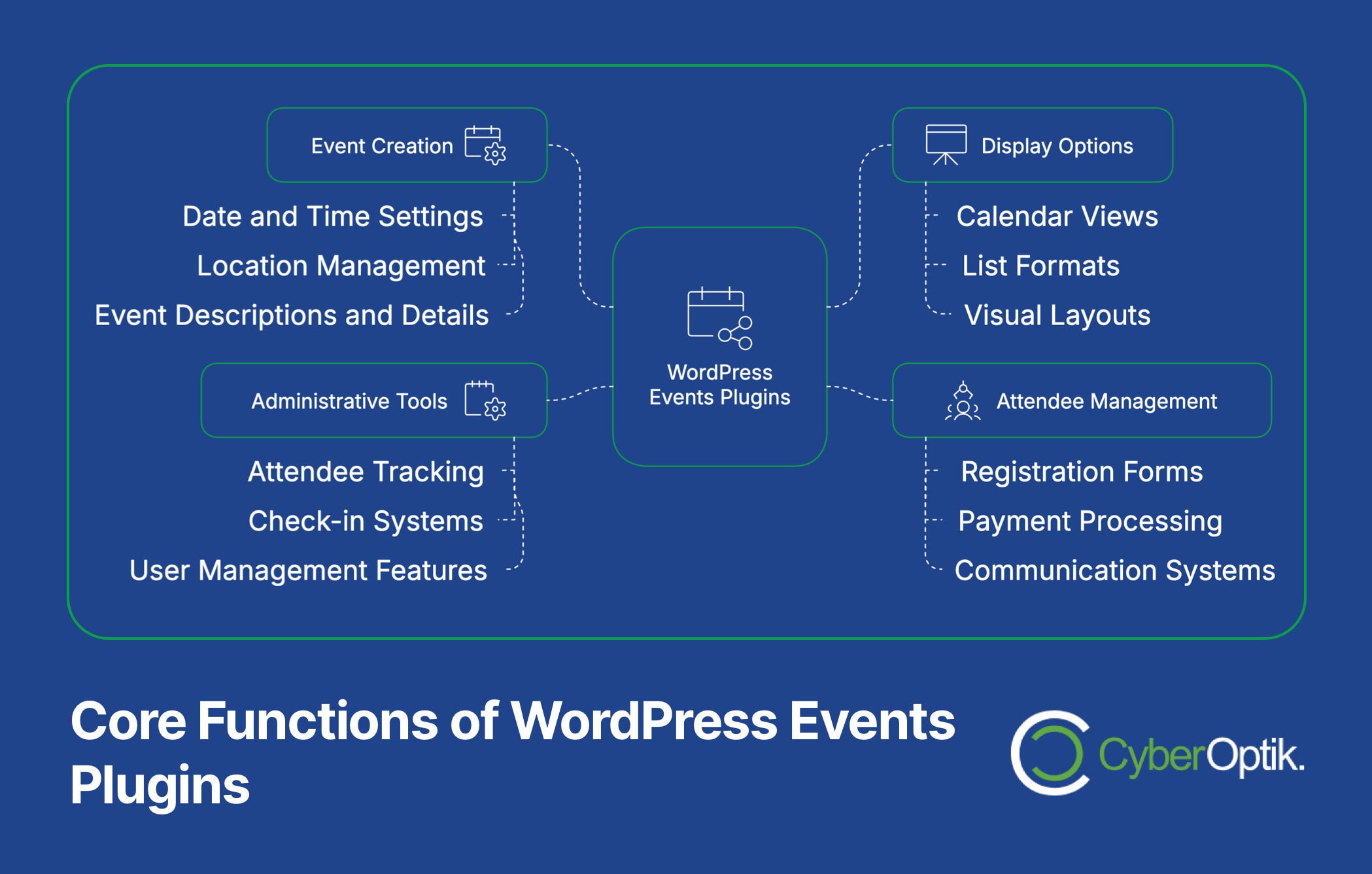
Registration capabilities form the foundation of any events plugin. Look for customizable registration forms, attendee limits, and waitlist functionality. The best systems also offer conditional logic to create dynamic registration experiences based on user selections.
Calendar display options matter for user experience. Most quality plugins provide multiple view options including monthly, weekly, daily, and list formats. Some also offer color coding by event category and filtering capabilities to help users find relevant events quickly.
| Essential Feature | Why It Matters | Implementation Complexity |
|---|---|---|
| Registration System | Collects attendee information and manages capacity | Medium |
| Calendar Views | Provides visual organization of events | Low |
| Payment Integration | Allows selling tickets or collecting fees | Medium-High |
| Email Notifications | Automates communication with attendees | Medium |
| Mobile Responsiveness | Ensures functionality on all devices | Medium |
This table highlights features that should be on your evaluation checklist. Each contributes significantly to creating a seamless event management experience on your website.
Payment processing integration deserves special attention for paid events. The plugin should support popular payment gateways like PayPal, Stripe, and credit card processing. Look for options that handle multiple ticket types, discounts, and tax calculations if needed.
What makes WordPress plugins so valuable for website functionality is their ability to extend core features without coding. Events plugins exemplify this by transforming a standard website into a complete event management system with minimal setup.
User management features handle the administrative side of events. This includes attendee tracking, check-in systems, and communication tools. Advanced plugins offer custom fields to collect specific information from registrants based on your requirements.
Top WordPress Events Plugins
After working with numerous WordPress installations, we’ve identified several standout events plugins. Each offers unique strengths that might make it ideal for your specific situation. Let’s examine the top contenders in detail.
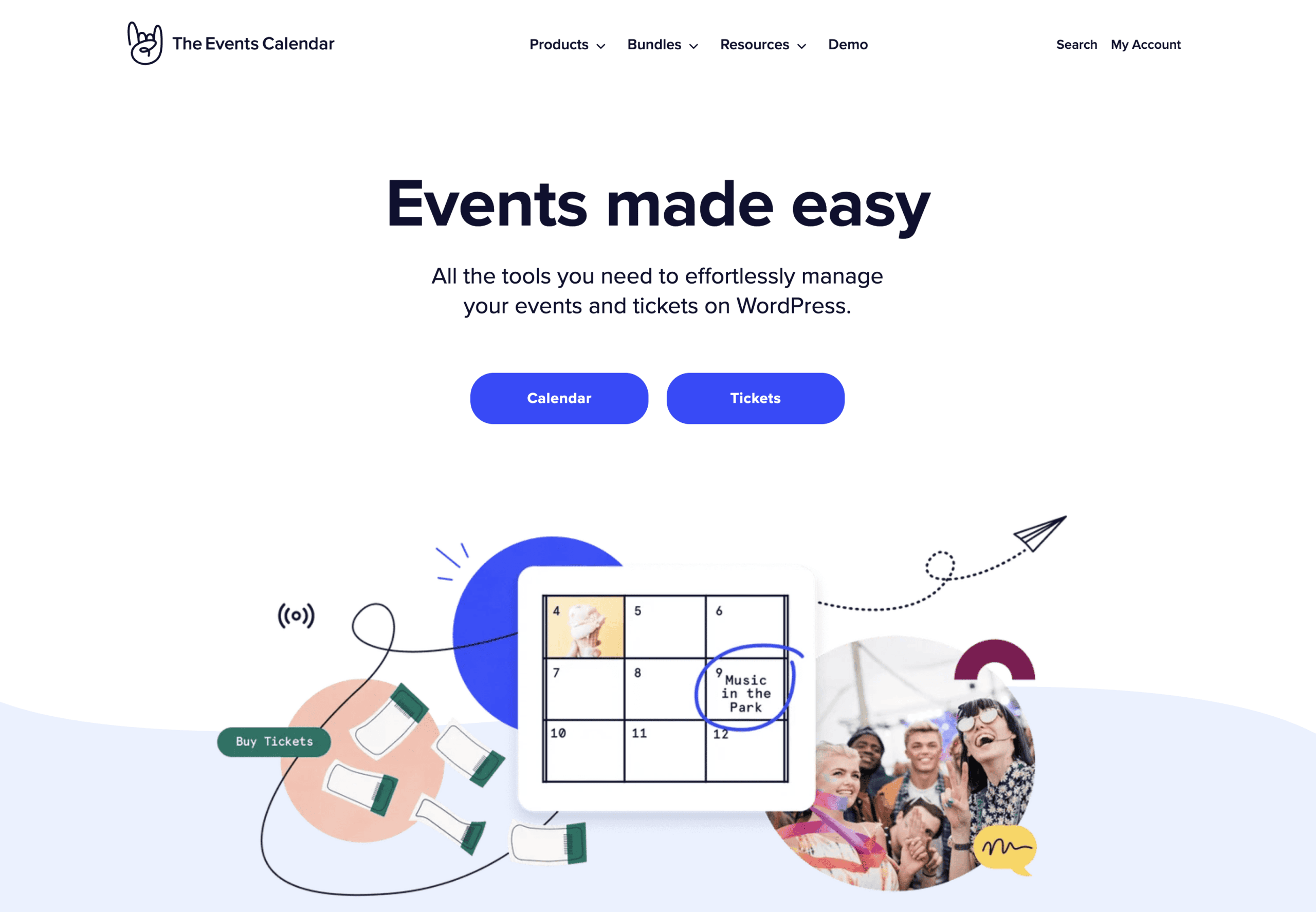
The Events Calendar stands as one of the most popular options. Developed by Modern Tribe, this plugin offers a clean, intuitive interface that integrates seamlessly with most WordPress themes. The free version provides solid calendar functionality and basic event management, while premium versions add advanced features.
Events Manager takes a different approach. It focuses on comprehensive booking and registration capabilities. The plugin handles complex ticketing scenarios including multiple ticket types and variable pricing. Its flexible approach works well for both simple and sophisticated event structures.
Modern Events Calendar earns praise for its visual appeal. The plugin includes over 40 predefined styles for calendar and event displays. This makes it particularly valuable for design-conscious websites where presentation quality matters as much as functionality.
| Plugin Name | Free Version | Premium Version | Annual Subscription |
|---|---|---|---|
| The Events Calendar | Basic features | $99 | $299 (all extensions) |
| Events Manager | Comprehensive | $75 | $20/month (Pro) |
| Modern Events Calendar | Limited features | $79 | $229 (lifetime) |
| EventOn | Not available | $39 | $125 (all addons) |
| Sugar Calendar | Basic calendar | $89 | $199 (ultimate) |
This pricing comparison helps you understand the investment required for each solution. Remember that premium versions typically offer better support and more robust features than free alternatives.
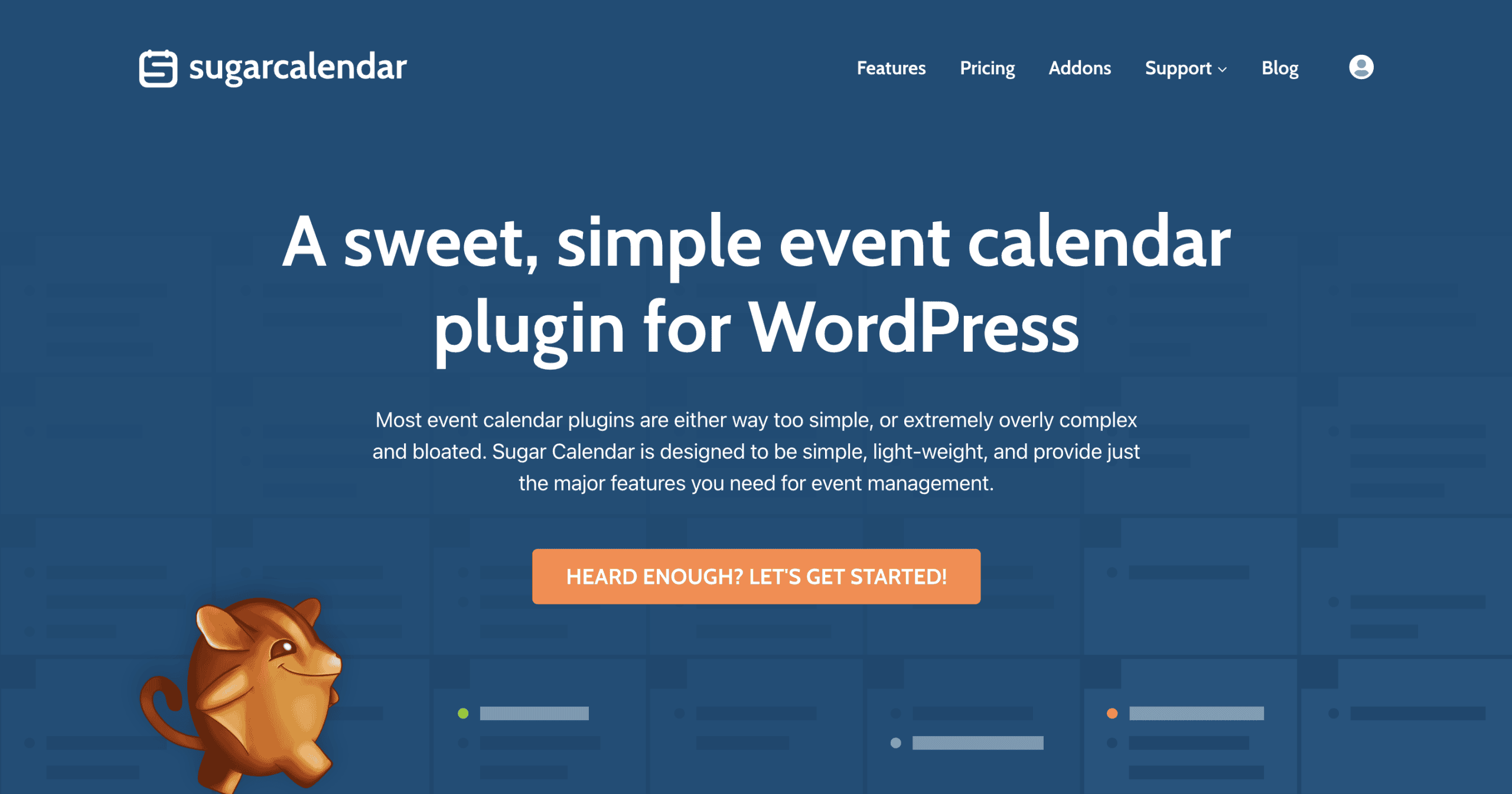
Sugar Calendar provides an elegant, lightweight solution. Created by the developers behind Easy Digital Downloads, it focuses on simplicity and ease of use. This makes it perfect for websites that need basic calendar functionality without complex registration systems.
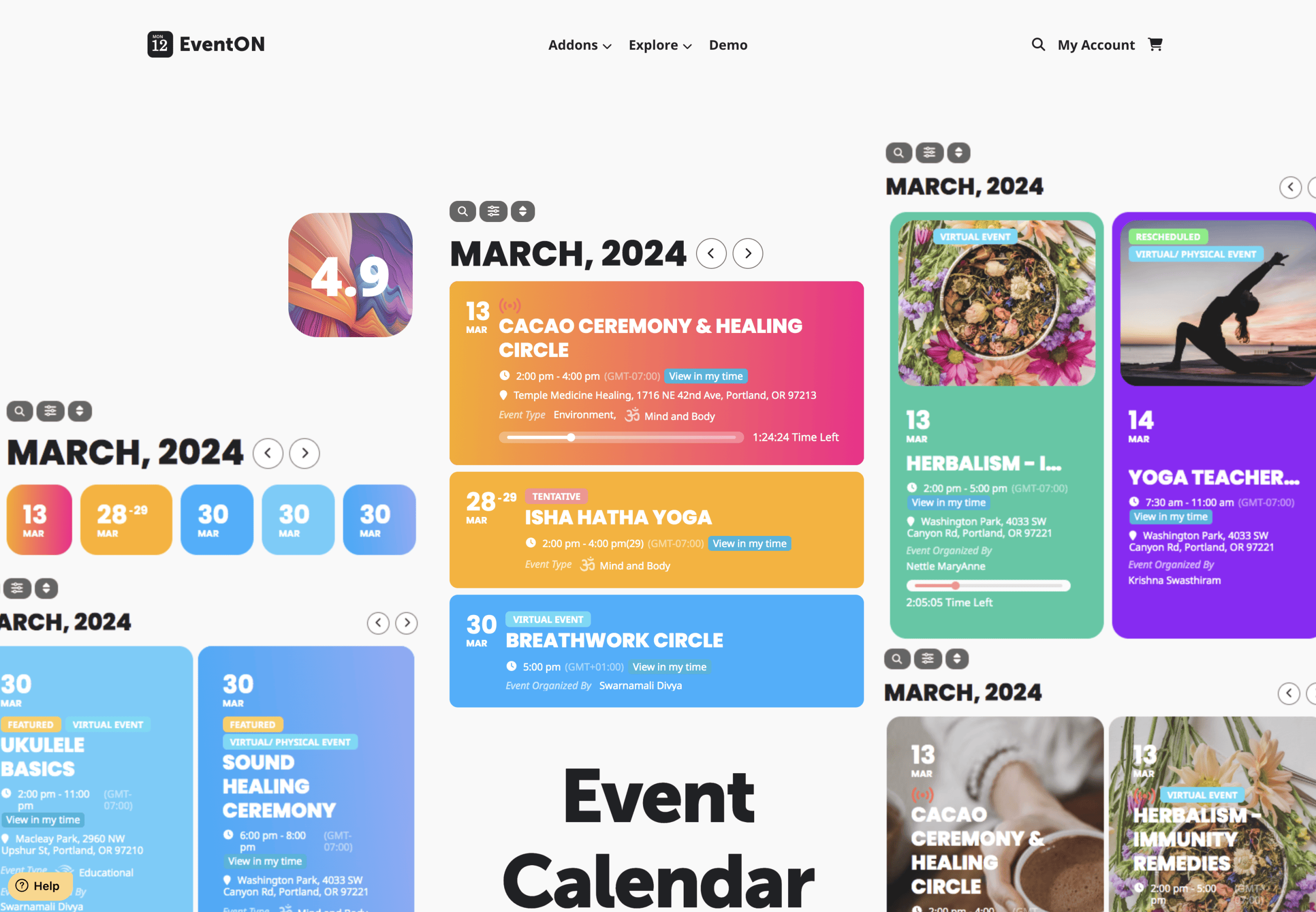
EventOn takes a more visual approach to event displays. It offers a variety of unique layouts including tiled and masonry formats. The plugin specializes in creating visually engaging event showcases that encourage user interaction and increase attendance.
Each plugin offers a distinctive approach to event management. Your selection should align with your specific requirements regarding budget, feature needs, and technical capabilities. Premium versions typically provide better support and more regular updates than free alternatives.
Detailed Features Comparison
To help you make an informed decision, we’ve created a comprehensive feature comparison. This detailed analysis shows exactly what each plugin offers across key functional areas. Understanding these differences will help you identify which tool best matches your needs.
User interface quality varies significantly between plugins. The Events Calendar offers perhaps the most polished experience, with intuitive controls and logical workflows. Modern Events Calendar prioritizes visual appeal with attractive preset designs. Events Manager provides deep functionality but with a slightly steeper learning curve.
| Feature | The Events Calendar | Events Manager | Modern Events Calendar | EventOn | Sugar Calendar |
|---|---|---|---|---|---|
| Calendar Views | Monthly, List, Day, Week | Monthly, List, Weekly | Monthly, Weekly, Daily, List, Grid, Agenda | Tiled, Masonry, Monthly | Monthly, List |
| Registration System | With Premium Add-on | Built-in | Built-in | With Add-on | Basic |
| Payment Gateways | 3 (Premium) | 5+ | 8+ | 2 (Add-ons) | Via Integration |
| Recurring Events | Yes (Premium) | Yes | Yes | Yes | Yes (Premium) |
| Frontend Submission | With Add-on | Yes | Yes | No | No |
This feature matrix highlights significant differences between popular events plugins. You can clearly see where each solution excels and where limitations might exist.
Customization capabilities determine how well you can adapt the plugin to your specific brand and needs. Events Manager offers extensive template customization and shortcode options. The Events Calendar provides well-documented hooks and filters for developers. Modern Events Calendar includes visual customizers for non-technical users.
Extension ecosystems provide ways to expand functionality beyond core features. The Events Calendar offers the most robust marketplace of add-ons, with specialized extensions for virtual events, community submissions, and ticketing. Events Manager relies more on built-in capabilities and third-party integrations.
With over 60,000 plugins available in the WordPress repository, finding the right solution requires careful evaluation. Events plugins must integrate well with your theme and other plugins for optimal performance.
Shortcode Flexibility and Usage
Shortcode implementation varies across plugins. This affects how easily you can place event displays in different parts of your website. Most plugins offer shortcodes for calendars, event lists, and registration forms, but with varying levels of customization options.
Events Manager provides the most flexible shortcode system. It includes dozens of parameters to control exactly what events display and how they appear. The Events Calendar offers fewer shortcode options but compensates with dedicated blocks for the WordPress editor.
Use Cases and Applications
Different types of organizations have unique event management requirements. Understanding how each plugin performs in specific scenarios helps you make the right choice. We’ve analyzed performance across common use cases to guide your decision.
Business events and webinars typically need registration capabilities and attendance tracking. Modern Events Calendar and Events Manager excel in this area. They offer robust registration forms, payment processing, and attendee communication tools essential for professional events.
Educational institutions require recurring event support and category organization. The Events Calendar handles these needs effectively with its series functionality and strong taxonomy system. This makes it simple to organize courses, workshops, and campus events in a structured way.
| Use Case | Recommended Plugin | Key Advantage | Potential Limitation |
|---|---|---|---|
| Business Events | Modern Events Calendar | Professional appearance, detailed registration | Higher learning curve |
| Educational Institution | The Events Calendar | Structured organization, recurrence | Advanced features require premium |
| Community Group | Events Manager | Frontend submission, flexible locations | Less visually polished |
| Entertainment Venue | EventOn | Visual appeal, image showcase | Less robust registration |
| Simple Calendar Needs | Sugar Calendar | Lightweight, easy setup | Limited advanced features |
This table maps specific organizational needs to the most suitable plugin options. Matching your use case to the right tool significantly improves implementation success.
Community groups benefit from frontend submission capabilities. Events Manager stands out here by allowing registered users to submit and manage their own events. This distributed approach works well for community hubs, religious organizations, and club websites.
Entertainment venues prioritize visual presentation and ticketing. EventOn offers the most visually distinctive layouts to showcase performances, shows, and exhibitions. Its tiled and masonry views create engaging visual calendars that highlight featured events effectively.
The concept of appointment scheduling functionality is closely related to event management. For service-based businesses that need one-on-one bookings rather than events, specialized appointment plugins might be more appropriate.
Implementation Best Practices
Successful plugin implementation requires more than simply activating the software. Following these best practices ensures your events management system works effectively and remains maintainable long-term. Our team has refined these recommendations through numerous client implementations.
Start with a staging environment. Test your chosen plugin thoroughly before deploying to your live site. This prevents disruption to your visitors and gives you time to configure all settings properly. Most reputable WordPress hosting providers offer staging functionality.
Configure settings thoughtfully from the beginning. Take time to review all plugin options and set them according to your specific needs. Pay special attention to date formats, time zone settings, and default views. These foundations affect how your events display across the site.
Common implementation pitfalls include:
- Data migration challenges – When transferring existing events from another system
- Calendar display conflicts – With certain WordPress themes
- Plugin compatibility issues – Particularly with caching and SEO plugins
- Performance degradation – When managing large numbers of events
Plugin updates require careful handling. Always backup your site before updating an events plugin. Read release notes to understand what changes are included. Test updates on a staging site first, especially for major version changes that might affect your existing event data or displays.
| Implementation Phase | Key Actions | Common Mistakes |
|---|---|---|
| Pre-Installation | Research requirements, check theme compatibility | Skipping compatibility checks |
| Installation | Use staging environment, install dependencies | Installing directly on live site |
| Configuration | Set time zones, permalinks, display options | Rushing through settings pages |
| Testing | Create test events, verify displays, test registration | Testing with admin account only |
| Deployment | Migrate to live site, monitor performance | No performance monitoring plan |
Following this implementation roadmap helps ensure a smooth setup process. Each phase builds on the previous one, creating a solid foundation for your events system.
Custom Integration Considerations
Integration with other systems often becomes necessary. Many organizations need to connect their WordPress events with email marketing platforms, CRM systems, or specialized industry software. Most premium plugins offer API access or direct integrations with popular platforms.
When custom development is required, choose plugins with well-documented hooks and filters. The Events Calendar and Events Manager provide particularly strong developer documentation. This makes custom integration work more straightforward and maintainable.
Performance Considerations
Events plugins can impact your website’s overall performance. Understanding these effects helps you implement solutions that remain fast and responsive. We’ve analyzed common performance patterns across popular events plugins.
Database impact varies significantly between plugins. Each handles event storage differently. Events Manager creates several custom database tables, while others use WordPress’s standard post types and meta fields. These different approaches affect query efficiency and overall database load.
Page load speed generally correlates with feature complexity. Lightweight options like Sugar Calendar have minimal impact on load times. Feature-rich solutions like Modern Events Calendar may increase page size and load times, especially when displaying many events with images and details.
WordPress powers 61.4% of all content management systems online. This large ecosystem provides many performance optimization tools compatible with events plugins, including caching solutions and image optimization tools.
| Plugin | Database Impact | Page Load Effect | Cache Compatibility | Mobile Performance |
|---|---|---|---|---|
| The Events Calendar | Medium | Low-Medium | Good | Excellent |
| Events Manager | High | Medium | Medium | Good |
| Modern Events Calendar | Medium-High | Medium | Medium | Good |
| EventOn | Low-Medium | Medium | Good | Medium |
| Sugar Calendar | Low | Low | Excellent | Excellent |
This performance comparison helps you understand the resource implications of each plugin. Consider these factors alongside feature requirements when making your selection.
Caching compatibility requires special attention. Events plugins dynamically display date-specific information that can conflict with caching mechanisms. Most premium plugins include built-in compatibility with popular caching solutions, but proper configuration remains important.
Large event catalogs can strain server resources. If you manage hundreds or thousands of events, consider these optimization strategies:
- Limit initial load – Display fewer events on first page load
- Implement pagination – Break large event lists into manageable pages
- Use AJAX loading – Load additional events dynamically as users scroll
- Archive past events – Move older events to an archive status
Mobile performance deserves special consideration. Event calendar displays can be challenging on small screens. The best plugins implement responsive designs that automatically adapt to different screen sizes. Test thoroughly on mobile devices to ensure usability.
Conclusion
Selecting the right WordPress events plugin significantly impacts your website’s effectiveness. The options we’ve explored offer different strengths suited to various use cases. Your specific requirements should guide your final decision.
For most general use cases, The Events Calendar provides an excellent balance of features, usability, and performance. Its intuitive interface and solid support make it suitable for a wide range of organizations. The premium extensions offer growth paths as your needs evolve.
Organizations with complex registration requirements should consider Events Manager or Modern Events Calendar. These provide sophisticated attendee management, payment processing, and communication tools. They excel at handling paid events with multiple ticket options.
Remember that implementation quality matters as much as plugin selection. Follow our recommended best practices for setup, testing, and maintenance. This ensures your events system performs reliably and remains easy to manage over time.
Need help implementing event management on your WordPress website? Our team at CyberOptik specializes in creating custom WordPress solutions for businesses across Chicago. We can help you select, implement, and optimize the right events plugin for your specific needs. Contact us today to discuss your project requirements.




